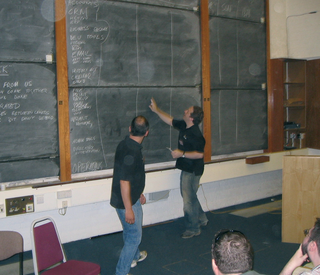
By Heike Jurzik
Brighton is a lovely seaside resort on the south coast of England. Apart from the pier with the famous funfair, the town offers a large beach, two universities, several nice restaurants, and some cozy pubs. The UKUUG summer meeting 2006 [1] was held at the University of Sussex, on a campus about four miles from the city center. Most of the attendees stayed in the students' halls on campus, which offered plenty of opportunity to socialize after pub closing time and enjoy some more geek talk on the lawn at night.
As with recent years, the conference started with a tutorial day on Thursday: Jos Vos described how to create, modify, and use RPM packages; Mark Leith talked about MySQL optimization, and Richard J. Moore held a workshop on diagnosing kernel-related problems using kdump and SystemTap.
Friday saw two presentation tracks with interesting talks on topics such as "Sed: more than just s/foo/bar/," "MySQL Roadmap", "Settling onto decent Python Web Technologies," and "Apache at the Register." Apart from these purely technical presentations, this year's conference also included several talks and open discussions about Open Source and Free Software in the public sector. Stuart Yeates from OSS Watch [2] gave an overview of "The State of Open Source in Higher and Further Education" and presented the results of a recent survey showing that three quarters of all UK colleges and universities at least consider OS solutions.
The subsequent talk by Mark Taylor and Duncan Gibb took a more practical approach: in an interesting presentation that included a lot of audience participation, they drew a picture of how to run a business on OS software as an alternative to proprietary solutions. In a private conversation that followed the talk, Mark, the president of the Open Source Consortium [3], said that "the technical argument for Free Software had been won years ago" and that it was now important to define a business model to help companies understand the fiscal implications.
Ted Haeger gave a talk about Suse Linux Enterprise Desktop, and he said that Novell was aiming itself at both the Open Source community and the business community. He claimed that Novell made "fast and easy interfaces," although a few technical problems with the presentation produced some friendly heckling from the audience. Someone in the audience asked, "Do you want to demonstrate this on my Ubuntu box, where it works?" to which Ted replied, "I want a box the code was written on, not just one it was pushed onto."
On Friday evening, everybody headed into town to attend the conference dinner at an Italian restaurant - an excellent choice, given that Italy won their World Cup match against the Ukraine that night, and the meal was excellent.
Saturday morning saw several talks for beginners. The talks included helpful sessions on how to choose a distribution, a session on getting started with Apache, and an excellent introduction to networking. Antony Stone explained the concepts behind networking, briefing newcomers on troubleshooting and security with memorable lines such as, "A firewall is a router that can say no."
The technical track on Saturday also had some highlights, such as John Pinner's lecture on how to control the heating system of a house with a Linux machine and some Python scripts. Philip Hands had a nice talk about "Automated Debian installs for fun and profit." He started his lecture by typing the following on the laptop he was using for the presentation:
dd if=/dev/zero of=/dev/hda bs=1024 count=1 ; sync ; reboot
After the closing session on Sunday, everyone headed back home. The conference was another great opportunity to meet up with other geeks - with mostly interesting and well-presented talks.
| INFO |
|
[1] UKUUG website: http://www.ukuug.org/
[2] OSS Watch: http://www.oss-watch.ac.uk/ [3] The Open Source Consortium: http://www.opensourceconsortium.org/ |